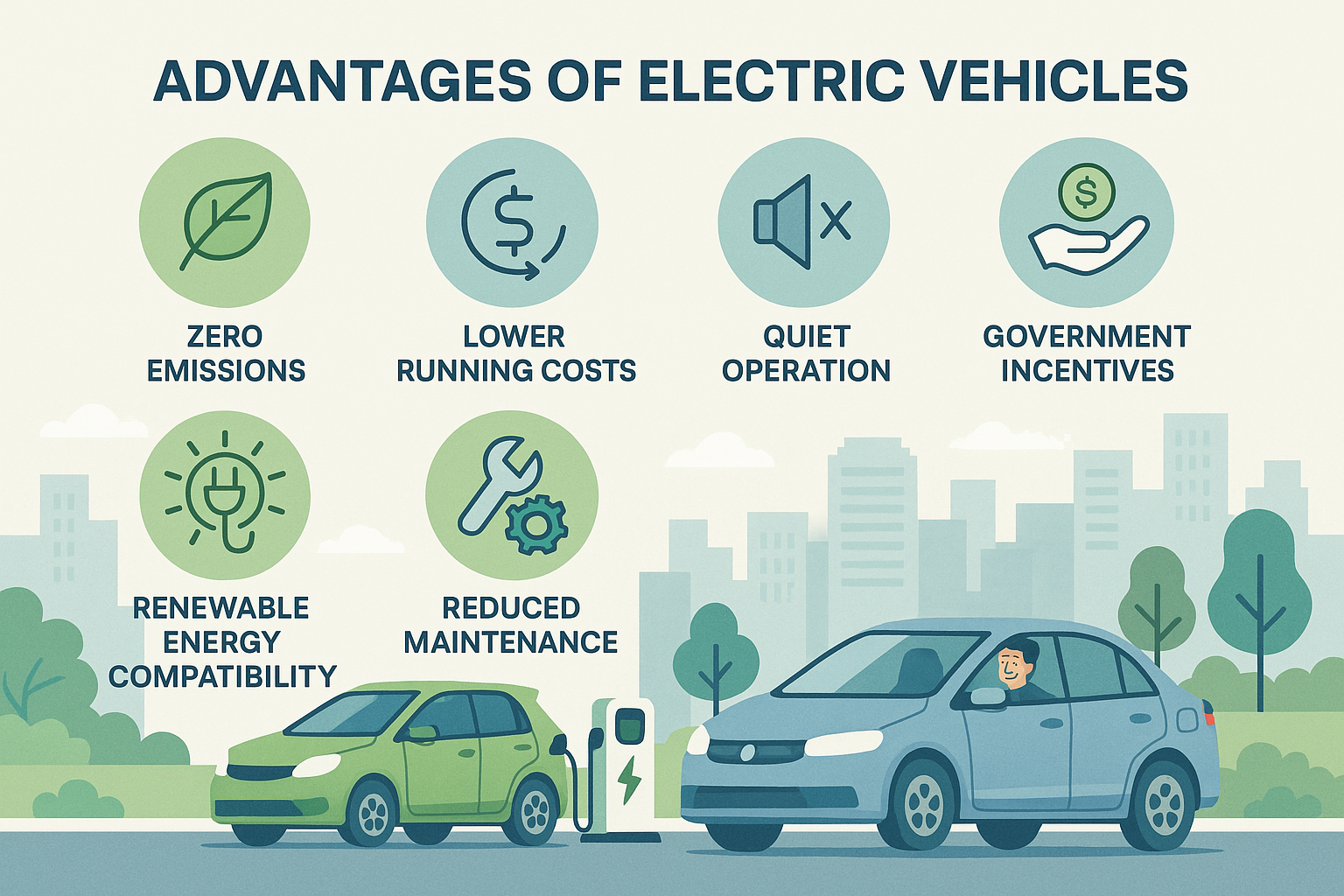

Unlocking the Future: 10 Incredible Electric Vehicle Advantages You Can’t Ignore
Electric vehicles (EVs) are making headlines for all the right reasons as the world rushes toward a sustainable future. The blog “Unlocking the Future: 10 Incredible Advantages of Electric Vehicles You Can’t Ignore” explores the life-changing advantages of switching to EVs. Electric vehicle advantages are numerous as they are compelling, ranging from significantly lowering your carbon footprint to experiencing lower operating costs. Imagine driving through the city in silence while helping to improve the quality of the air. Technological advancements and expanding infrastructure continue to eliminate the obstacles to switching to EVs. Whether you’re a tech enthusiast or an environmentally conscious commuter, there is a place for you in this revolution. Let’s examine how electric cars are essential to a smarter, greener future—and not just a passing fad.
Environmental Benefits of Electric Vehicles
Electric vehicles (EVs) revolutionize environmental sustainability. One of the electric vehicle advantages is the dramatic reduction of greenhouse gas emissions. Traditional gasoline-powered vehicles emit harmful pollutants such as carbon dioxide (CO2), nitrogen oxides (NOx), and particulate matter. These pollutants contribute heavily to air pollution. In contrast, EVs produce no tailpipe emissions. Every mile driven in an EV contributes to cleaner air and a healthier planet.
The rise of renewable energy sources like solar and wind power further enhances EVs’ green credentials. As the electrical grid shifts toward cleaner energy, emissions related to EV charging continue to decline. The synergy between clean energy and electric mobility creates a positive feedback loop that maximizes environmental benefits. We live in an exciting era, where transformative technologies combine to create a healthier, more sustainable world.
Cost Savings and Economic Advantages
Switching to an electric vehicle offers substantial financial benefits. EVs convert a higher percentage of battery energy into wheel power, making them more efficient than their gasoline counterparts. Since electricity costs less per mile than gasoline, EV drivers enjoy lower fuel expenses.
Additionally, EVs require less maintenance due to their simpler mechanical systems. Unlike internal combustion engine (ICE) vehicles, EVs don’t need oil changes, transmission repairs, or exhaust system maintenance. Regenerative braking also reduces brake pad wear, further lowering maintenance costs.
These savings extend beyond individual wallets. The expanding EV industry has created jobs in manufacturing, battery production, and charging infrastructure development. As investment grows, it fuels innovation and boosts economic growth. The EV market’s rise benefits communities, businesses, and consumers alike.
Performance and Driving Experience
Electric vehicles offer a superior driving experience that outshines many traditional cars. One of the standout features is instant torque delivery. EVs accelerate smoothly and quickly, providing a dynamic and enjoyable drive.
Their quiet operation adds to the appeal. EVs reduce noise, vibration, and harshness, creating a calm driving environment. On long trips, this quietness enhances comfort and reduces driver fatigue. Conversations, music, and the sounds of nature come through clearly without engine noise.
The low center of gravity, due to battery placement, improves handling and stability. EVs stay balanced through corners and curves, making them both practical and exhilarating. As automakers continue innovating, electric vehicles will deliver even more exciting performance features.
Charging Infrastructure: Current State and Future Developments
The growth of EVs relies heavily on robust charging infrastructure. Fortunately, the number of charging stations has increased significantly in recent years. Today, public chargers span urban centers, suburban neighborhoods, and rural regions.
Various charger types support different user needs. Level 1 chargers, which plug into standard outlets, work well for overnight home charging. Level 2 chargers offer faster charging and are common in public places like malls and offices. DC fast chargers provide rapid power boosts—recharging batteries to 80% in about 30 minutes—ideal for long-distance travel.
Future advancements will improve convenience and efficiency. Wireless charging and ultra-fast stations aim to reduce downtime. Smart grid technology and vehicle-to-grid (V2G) systems will allow EVs to interact with the power grid, optimizing energy use and offering new benefits for owners. As these innovations roll out, the charging experience will become even more seamless.
Government Incentives and Tax Benefits
Government policies play a crucial role in accelerating EV adoption. Many countries and states offer incentives that make EVs more affordable. These incentives may include tax credits, rebates, or grants, significantly lowering upfront costs.
Non-monetary benefits add further appeal. EV drivers may receive preferential parking, toll reductions, or access to carpool lanes. These perks save time and money, making EV ownership even more attractive. For instance, using high-occupancy vehicle (HOV) lanes during peak traffic can drastically shorten commutes.
Governments are also investing in EV infrastructure. Public funds, paired with private investments, help build a charging network that supports current and future demand. As clean transportation remains a policy priority, expect ongoing support for EV-related initiatives.
Technological Innovations in Electric Vehicles
The electric vehicle industry leads the charge in automotive innovation. Another one of the Electric Vehicle Advantages is Battery technology. Battery technology is advancing rapidly, with improvements in energy density, charging speed, and lifespan. Solid-state batteries, for example, promise safer and more efficient energy storage.
EVs also integrate cutting-edge driver assistance systems. Features like adaptive cruise control, lane-keeping assist, and automated emergency braking enhance safety and convenience. Some manufacturers are developing fully autonomous EVs, aiming to redefine personal and shared transportation.
Connectivity further enriches the EV experience. Over-the-air (OTA) updates, remote diagnostics, and sophisticated infotainment systems offer seamless digital integration. As technology evolves, EVs will become smarter and more intuitive.
Comparison with Traditional Gasoline Vehicles
Comparing EVs to gasoline vehicles highlights their many strengths. Environmentally, EVs outperform gas-powered cars due to zero tailpipe emissions. This difference directly impacts urban air quality and climate change mitigation.
From a financial standpoint, EVs often cost less to operate over time. Lower fuel and maintenance expenses balance out—or even surpass—their higher purchase prices. With fewer moving parts, EVs experience fewer mechanical issues.
Performance also favors electric cars. Their quick acceleration and quiet ride enhance the driving experience. While gasoline vehicles still offer longer ranges and quicker refueling, EV technology is rapidly closing the gap.
Overcoming Common Myths About Electric Vehicles
Despite growing popularity, misconceptions still surround EVs. One common myth is that EVs lack the range for long-distance travel. In reality, many modern EVs can travel hundreds of miles per charge. Expanding fast-charger networks further support long road trips.
Another myth claims EVs are too expensive. While upfront costs may be higher, incentives and lower running expenses often make EVs more economical in the long run. Government programs and competitive financing help bridge the affordability gap.
A third myth concerns environmental impact. Critics argue that battery production and electricity generation offset EV benefits. However, studies show that EVs have significantly lower lifecycle emissions than gasoline vehicles. As renewable energy use increases, EVs will become even cleaner.
Conclusion: The Future of Transportation and Electric Vehicles
Electric vehicles are reshaping transportation in meaningful and lasting ways. Electric vehicle advantages ranges from cost savings and environmental impact to cutting-edge tech and performance, EVs present a compelling choice for modern drivers. Continued advancements in infrastructure, policy, and innovation are eliminating previous barriers.
EVs represent more than a trend—they signal a fundamental shift in how we move and how we protect the planet. Choosing electric means contributing to cleaner air, reduced emissions, and a more resilient economy. It also supports industries that drive innovation and sustainable progress.
The future is electric, and it’s already underway. Whether you’re passionate about technology, committed to sustainability, or simply seeking a better driving experience, now is the perfect time to make the switch. Join the movement toward smarter, cleaner mobility—and be part of a future built on progress.
Add a comment Cancel reply
Categories
- Car News (10)
- Car Reviews (7)
- Educational Tips (7)
- Electric Cars (9)
- EV Battery (1)
- EV Charging (8)
- EV Testing (3)
- Uncategorized (28)
Recent Posts
Related posts


EV Myths vs Facts What You Really Need to Know

The Green Revolution How EVs Are Leading the Way









